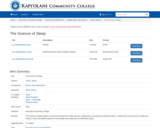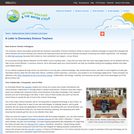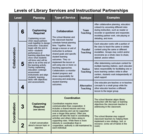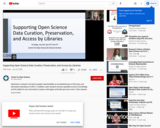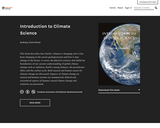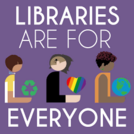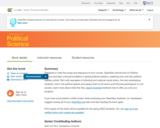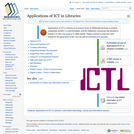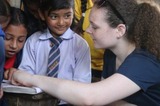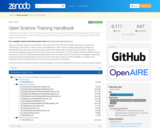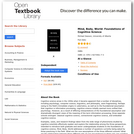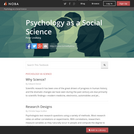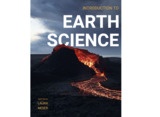Introduction to Earth Science is a 530+ page open textbook designed to provide a comprehensive introduction to Earth Science that can be freely accessed online, read offline, printed, or purchased as a print-on-demand book. It is intended for a typical 1000-level university introductory course in the Geosciences, although its contents could be applied to many other related courses.
This text includes various important features designed to enhance the student learning experience in introductory Earth Science courses. These include a multitude of high-quality figures and images within each chapter that help to clarify key concepts and are optimized for viewing online. Self-test assessment questions are embedded in each online chapter that help students focus their learning. QR codes are provided for each assessment to allow students using print or PDF versions to easily access the quiz from an internet-capable device of their choice.
Adapted from openly-licensed works in geoscience, the sequence of the book differs from mainstream commercial texts in that it has been arranged to present elementary or foundational knowledge regarding rocks and minerals prior to discussion of more complex topics in Earth Science. Unlike prominent commercial texts for Earth Science, this book dedicates an individual chapter to each of the three major rock types, the processes of mass wasting, geological time, Earth history, and the origin of the universe and our solar system. Book content has been further customized to match the Pathways General Education Curriculum at Virginia Tech with a focus on Student Learning Outcomes (SLOs) for Pathways Concept 4, Reasoning in the Natural Sciences.
Are you a professor reviewing or adopting this book for a course?
Instructors adopting or reviewing this text are encouraged to record their use on this form: https://bit.ly/interest_intro_earth_science. This helps the book's sponsors to understand this open textbook's impact.
How to Access the Book
This text is available in multiple formats including PDF, a low-resolution PDF which is faster to download, and ePub [coming mid 2023]. These are available at: https://doi.org/10.21061/introearthscience. The book is also available in HTML/Pressbooks at https://pressbooks.lib.vt.edu/introearthscience. Softcover print versions with color interior are available at the manufacturer’s lowest price at https://www.amazon.com/dp/1957213361. The main landing page for this book is https://doi.org/10.21061/introearthscience.
PDF: ISBN 978-1-957213-34-7
HTML/Pressbooks: ISBN 978-1-957213-33-0
https://pressbooks.lib.vt.edu/introearthscience
Print: ISBN 978-1-957213-36-1 https://www.amazon.com/dp/1957213361
ePub: ISBN 978-1-957213-35-4 [expected mid 2023]
Table of Contents
1. Understanding Science
2. Plate Tectonics
3. Minerals
4. Igneous Processes and Volcanoes
5. Weathering, Erosion, and Sedimentary Rocks
6. Metamorphic Rocks
7. Geologic Time
8. Earth History
9. Crustal Deformation and Earthquakes
10. Mass Wasting
11. Water
12. Coastlines
13. Deserts
14. Glaciers
15. Global Climate Change
16. Energy and Mineral Resources
17. Origin of the Universe and Our Solar System
Find, Adapt, and Share Resources
If you wish to share resources you build from this book or find those shared by other adopters of this book, please join the Instructor Resource Portal in OER Commons at https://www.oercommons.org/groups/introduction-to-earth-science-instructor-group/12785
Attribution
This work includes content from multiple sources reproduced under the terms of Creative Commons licenses, Public Domain, and Fair Use. Specifically: Chapters 1-16 are adapted from An Introduction to Geology https://slcc.pressbooks.pub/introgeology (CC BY NC SA) by Chris Johnson, Matthew D. Affolter, Paul Inkenbrandt, and Cam Mosher. Chapter 17 is adapted from Section 22.1 of Chapter 22 “The Origin of Earth and the Solar System” by Karla Panchuk in Physical Geology, 2nd edition (CC BY) by Steven Earle https://opentextbc.ca/physicalgeology2ed/part/chapter-22-the-origin-of-earth-and-the-solar-system, with Sections 7.1, 7.2, 7.3, and 7.4 of Chapter 7 “Other Worlds: An Introduction to the Solar System” https://openstax.org/books/astronomy-2e/pages/7-1-overview-of-our-planetary-system from OpenStax Astronomy, 2nd edition https://openstax.org/details/books/astronomy-2e (CC BY). And, figures are from a variety of sources; references at the end of each chapter describe the terms of reuse for each figure. Version notes located at the end of the book describe author changes made to these materials by chapter.
About the Author
Laura Neser, Ph.D. is an Instructor in the Department of Geosciences at Virginia Tech. Dr. Neser earned her B.S. in Geosciences at Virginia Tech in the spring of 2008 and completed her Ph.D. in Geological Sciences at the University of North Carolina at Chapel Hill (UNC) in 2014. Her doctoral research focused on the structural geology, sedimentology, and stratigraphy of formations that were deposited along the flanks of the Beartooth Mountains as they rose during late Paleocene-Eocene time. Dr. Neser has worked as an athletic tutor and online instructor at The University of North Carolina (Chapel Hill, NC), in temporary positions as an Adjunct Instructor at Chowan University (Murfreesboro, NC) and Full-Time Lecturer at Indiana State University (Terre Haute, IN), and as a Professor at Seminole State College (Sanford, FL) before starting as an Instructor at Virginia Tech in the fall of 2021.
Although she is currently focused on teaching online sections of Introduction to Earth Science, Earth Resources, Society and the Environment, and Climate History, her teaching background is significantly broader and includes Environmental Science, Astronomy, Environmental Ethics, Earth History, Structural Geology, and Field Geology.
Suggested Citation
Neser, Laura (2023). Introduction to Earth Science. Blacksburg: Virginia Tech Department of Geosciences. https://doi.org/10.21061/introearthscience. Licensed with CC BY-NC-SA 4.0. https://creativecommons.org/licenses/by-nc-sa/4.0.
Report Errors: https://bit.ly/report_error_intro_earth_science
View Errata: https://bit.ly/errata_intro_earth_science
Funding and Project Support
This publication was made possible in part through funding and publishing support provided by the Open Education Initiative of the University Libraries at Virginia Tech.
Accessibility Statement
Virginia Tech Publishing is committed to making its publications accessible in accordance with the Americans with Disabilities Act of 1990. The Pressbooks (HTML) and ePub versions of this text are tagged structurally and include alternative text, which allows for machine readability.
Disclaimer
This work may contain components (e.g., illustrations, or quotations) not covered by the license. Every effort has been made to clearly identify these components but ultimately it is your responsibility to independently evaluate the copyright status of any work or component part of a work you use, in light of your intended use. Please check the references at the end of each chapter before redistributing.

